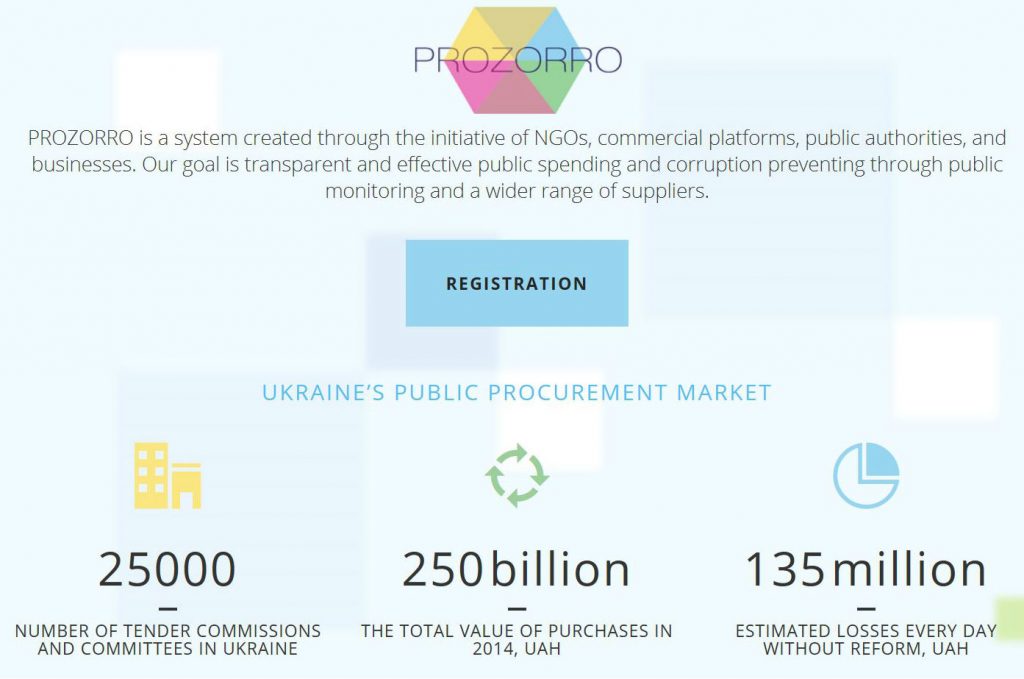As Ukraine struggles with a collapsing economy and Russian-backed separatists in the Donbas, a third crisis threatens its long-term national stability: endemic corruption.
Ukraine ranks 142nd out of 175 countries on Transparency International’s latest annual Corruption Perceptions Index. Of the fifteen former Soviet republics, only Tajikistan and Uzbekistan score lower. Official graft is widespread, but public procurement corruption tops the Kyiv government’s list of challenges. In early 2014, Ukrainian Prime Minister Arseniy Yatsenyuk noted that 40 percent of the $25 billion spent annually on public procurement “stays in the corrupt pockets of the people who carry out these purchases.” Under the old regime, 50 percent kickbacks in state tenders was considered normal, and a survey from Business Environment and Enterprise Performance discovered that an astounding 99 percent of firms expect to pay bribes to win government contracts.
State-owned enterprises (SOEs) and government officials employ many corrupt schemes to line their pockets. In a typical ploy called “associated party procurement,” several companies controlled by one owner “compete” with each other to win a contract—resulting in a fictional tender won by a predetermined firm, even if that firm offers the most expensive proposal.
One example of this under the old regime, as described by Ukraine’s Anti-Corruption Action Center (ANTAC), involved a Ministry of Health tender for HIV drugs in which a single entity, the Bahriy Group, controlled all individual bidders. The net result was higher prices and fewer HIV-positive patients receiving treatment. Another example was the 2011 purchase by Naftogaz of a drilling rig in which the only bidders were both controlled by the same two people. In the end, Naftogaz paid $400 million for a $250 million rig, with the remaining $150 million disappearing down a black hole.
Luckily for Ukraine’s long-suffering taxpayers, Kyiv recently enacted legislation aimed at dramatically reforming procurements by government entities as well as SOEs. The new law requires open public tenders for all purchases above certain threshold amounts (100,000 hryvnia for services and one million hryvnia for public works). Besides obliging state purchasers to announce tenders on their websites, the law also limits sole-source procurements and forbids participation by Ukrainian firms registered offshore. Reflecting the influence of young reformers in post-Maidan Ukraine, journalists, and members of civil society groups may now attend bid openings and videotape the proceedings.
Besides the new procurement law, the government has launched an e-procurement system called Prozorro in conjunction with Transparency International Ukraine. Prozorro uses an e-auction format; anyone can access procurement documents and data online. TI Ukraine official Viktor Nestulia said Prozorro has already boosted transparency and saved money.
While the fight against public procurement corruption is off to a good start, Ukraine’s government still has much work to do. First, it should pass a law requiring all bidders to list their owners. As the Naftogaz and Ministry of Health examples illustrate, it is easy enough to create the appearance of multiple bidders, even though one owner stands behind them all. According to Nestulia, lawmakers attempted but failed in July to pass a draft beneficial owners’ law through Ukraine’s Parliament. The government should re-submit this draft to parliament and twist arms to push it through.
Second, given Prozorro’s initial success, all government and SOE procurement should be moved to the Prozorro platform. Nestulia said Ukrainian officials have discussed this, but to date no legal basis to do so exists. A good model for Ukraine is Chile. In 2003, the South American country created ChileCompra, an e-commerce platform that puts tenders, awards, bidding processes, rules, regulations, and other procurement data on a single online portal. The adoption of ChileCompra has dramatically boosted transparency in government procurement, says a study by the United Nations Development Program, by ensuring that all state purchases remain arms-length transactions between buyers and sellers, thereby reducing opportunities for corruption. Ukraine desperately needs this.
Third, Ukraine should eventually harmonize all procurement legislation with the European Union, a requirement for the Deep and Comprehensive Free Trade Agreement (DCFTA) Ukraine signed with the EU. One particular advantage of EU procurement law is that all government procurements exceeding €133,000 must be listed on the EU’s Tender Electronics Daily (TED) platform. Between TED and Prozorro, it should become increasingly difficult for corrupt buyers and sellers to cheat Ukrainian taxpayers.
Finally, Ukraine’s government should immediately force the Ministry of Health to implement a new March law outsourcing the purchase of medicine to six global NGOs. Drug procurement has been a cesspool of corruption, and outsourcing this responsibility to reputable NGOs like the World Health Organization is an ideal solution to fight graft.
Despite the law’s existence, the ministry is fighting to keep the 4.3 billion hryvnia budgeted for 2015 drug procurement for itself. Whether such resistance represents a last stand by Ukraine’s corrupt vested interests or a continuation of business as usual will go a long way to determining how serious Kyiv really is about procurement reform.
Josh Cohen, an ex-USAID project officer who managed economic reform projects throughout the former Soviet Union, is a business development professional. He also contributes to foreign policy-focused media outlets and tweets at @jkc_in_dc.
Image: Kyiv recently enacted legislation aimed at dramatically reforming procurements by government entities as well as state-owned enterprises. The new law requires open public tenders for all purchases above certain threshold amounts (100,000 hryvnia for services and one million hryvnia for public works). Besides obliging state purchasers to announce tenders on their websites, the law also limits sole-source procurements and forbids participation by Ukrainian firms registered offshore. And the government has launched an e-procurement system called Prozorro in conjunction with Transparency International Ukraine. Prozorro uses an e-auction format; anyone can access procurement documents and data online. Credit: Prozorro screen shot

